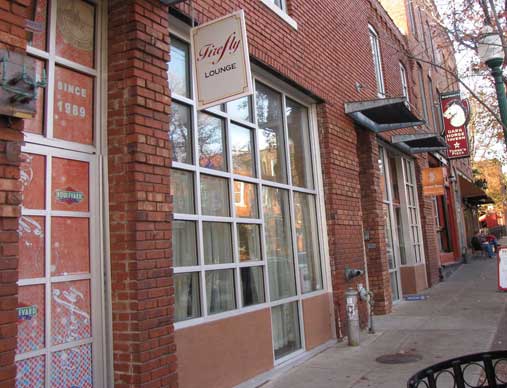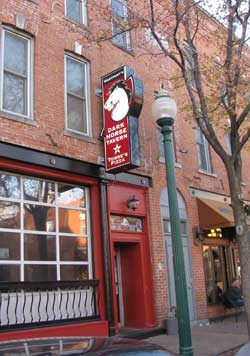
Three Westport businesses, the Firefly Lounge, the Dark Horse Tavern and Torre’s Pizza have been sharing a liquor license – something allowed under Kansas City law if they are connected by open doors between them. The Liquor Control Board yesterday heard a complaint from owner Bill Nigro, who said he should not have been cited for allowing the door to be closed. The hearing raised issues of how to control liquor licenses.
A dispute Thursday over a door linking two Westport bars revealed problems with a city liquor license law and plans to end density requirements that stop new tavern licenses there.
After hours of testimony, the city Liquor Control Board of Review voted to suspend Westport bar manager Bill Nigro’s liquor license for two days for at least the two connected bars, Darkhorse Tavern and Firefly.
But board members said the case showed impracticalities in a city law that allows one tavern liquor license to cover two or more bars if an open public access door connects them all.
The door law went into effect in 2009 as a way around density requirements that stopped new taverns in Westport and some other places.
The density requirements enacted more than 15 years ago were to prevent large numbers of bars in neighborhoods, said Gary Majors, manager of the city’s Regulated Industries Division. One tavern is allowed for every 1,500 residents within 3,000 feet of its front door.
But partly because of the Nigro case, negotiations are under way to end the density requirement in Westport. The proposal is likely to go before the city council in about a month, Majors said after the hearing.
Legal changes over the years have made the density requirement less useful, he said. Now every license has a six-month probation and more people must consent before licenses are issued, he said.
Jon C. Engelman, director of the Westport Regional Business League, testified that the door controversy shows a need for a more comprehensive approach to the license problem.
But he said after the meeting that he takes no position on ending the density requirement and feels there is no consensus on it.
 Nigro’s case demonstrated the problems of keeping an open door between two bars. One bar has a cover charge and the other does not, and the open door presents a security problem because it is near an office and liquor storage room, Nigro testified. His liquor license is for those two bars and also Torre’s Pizza, which is connected to them.
Nigro’s case demonstrated the problems of keeping an open door between two bars. One bar has a cover charge and the other does not, and the open door presents a security problem because it is near an office and liquor storage room, Nigro testified. His liquor license is for those two bars and also Torre’s Pizza, which is connected to them.
City officials said inspectors went over there six times and found the door between Darkhorse and Firefly closed, sometimes with signs on it saying “Firefly VIP only” or “staff only.”
Majors said he issued warnings repeatedly and finally asked for a four-day suspension for violations on June 17 and August 25.
Nigro said he paid a worker $1,000 a month to man that door and it was usually open when both bars were open. There was no violation when it was closed because people could walk through the kitchen to enter the Firefly, he said, but board members rejected that argument.
It was closed during one inspection because Firefly was about to close and the band’s gear was stored on its side of the door, he said.
“I’m serving people who are intoxicated,” he said. “I can’t count on them not tripping.”
Nigro said he has not decided if he will appeal the ruling to Jackson County Circuit Court.



Who’s talking